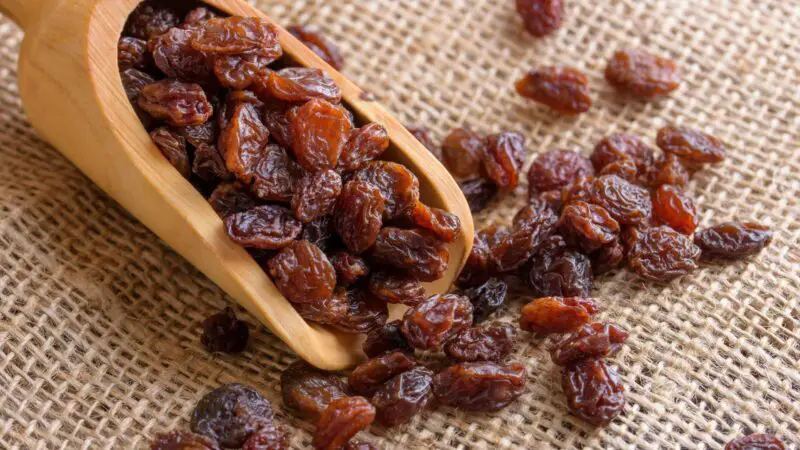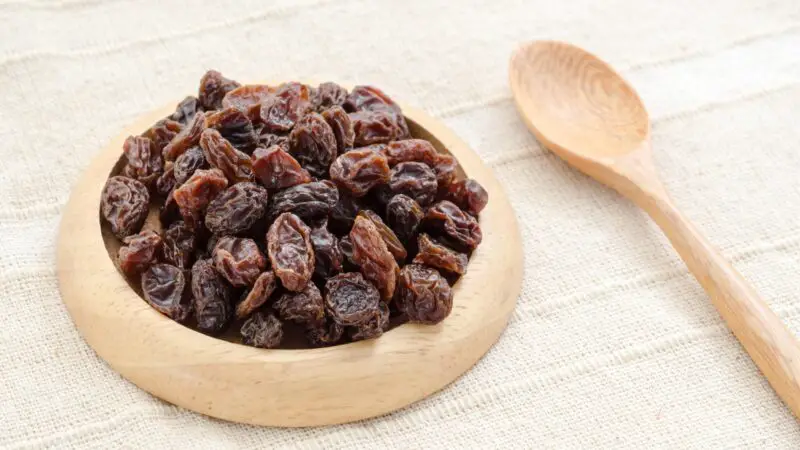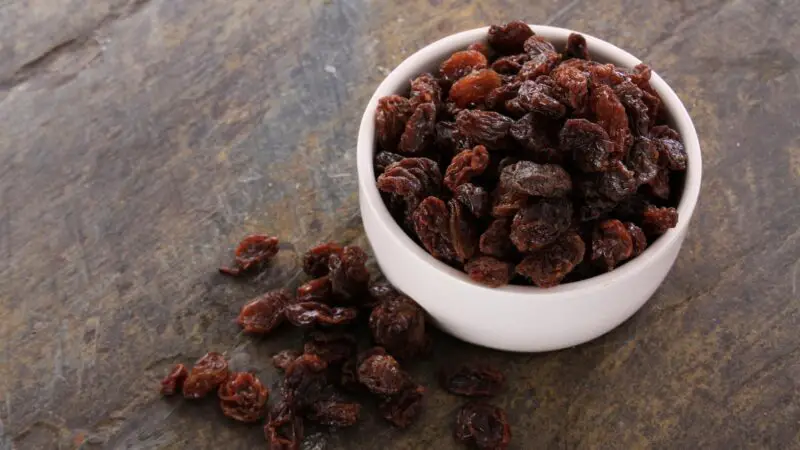There is something very tasty on the menu today – raisins! They are the perfect fruit-dessert snack – sugary, chewy, dried fruit that we can put as topping on desserts, ice creams, addition to trail mix or cereals for breakfast, baked goods and much more.
Guinea pigs cannot eat raisins. This dried fruit is full of sugar, which is not well digested by guinea pigs. Also, the raisins are sticky and very chewy, so this is really a bad thing for the teeth of the guinea pig. If they are not chewed properly by the cute little guinea pig, they will present a choking hazard!
Nutrition Facts of Raisins

For 3 oz (100 g) of seedless raisins, these are the nutrients:
- High in calories – 299 calories. The raisins are very caloric. In high amounts, they could lead to weight changes in guinea pigs.
- High in carbs and protein – 79.2 g of carbs and 3.1 g of proteins. Raisins are very rich in carbs, and this also is a potential risk for rapid weight gain.
- Fiber – 3.7 g. The amount of fiber in raisins is normal. Such an amount of fiber regulates the bowel movements and contribute to healthy stools. Excess fibers cause diarrhea, and lack of fibers can cause constipation.
- High in sugar – 59.2 g. The amount of sugar in raisins is too high! The poor little cavies cannot digest too much sugars.
- Low in fat – 0.5 g. The raisins don’t have lots of fats, which is somewhat good for the blood vessels. On a constant basis, a lot of fats could clog the blood vessels and impair cardiovascular health.
- Vitamin C – 4%. With this, the guinea pigs will be protected from the scurvy, a fatal disease. Sadly, because they can’t eat raisins, they will not get this vitamin from them.
- Vitamin E – 1%. This vitamin is essential for healthy skin. It can prevent early skin aging, certain cancers, heart diseases, and also reduces inflammation.
- Vitamin K – 4%. This vitamin helps the blood clot very fast, in case of injuries. The K vitamin helps in the production of the prothrombin, a protein that clots the blood.
- Thiamin – 7%. This is the B1 vitamin, and it improves the health of the stomach, intestines, heart, muscles, and brain.
- Riboflavin – 7%. Also known as B2 vitamin, it breaks down consumed foods and converts them into energy for the body. Also, it promotes good oxygen flow through the organism.
- Niacin – 4%. The B3 vitamin, also known as niacin, lowers cholesterol, prevents heart diseases and diabetes. It also improves the skin quality and eases arthritis pains.
- Vitamin B6 – 9%. The B6 vitamin boosts the production of the serotonin (happiness hormone), and it reduces stress.
- Pantothenic acid – 1%. Known as the B5 vitamin, this vitamin makes blood cells and also converts food into energy.
- Calcium – 5%. Calcium is the mineral essential for strong bones. However, if the guinea pig is already adult and fully grown, this mineral can damage its urinary system, even fatally!
- Iron – 10%. The iron is a compound that keeps the blood safe from anemia.
- Magnesium – 8%. Magnesium keeps the muscles strong and healthy, removes any kind pain in the body, and prevents diabetes and heart diseases.
- Zinc – 1%. The zinc mineral contributes to a healthy and fast wound healing, and it boosts the immunity as well.
- Copper – 16%. The copper is crucial for the formation of red blood cells. It works together with the iron to keep the blood in optimal health and safe from anemia. The copper can also prevent cardiovascular diseases and osteoporosis as well.
- Manganese – 15%. A very strong antioxidant; manganese removes the free radicals in the organism and the damage they cause. It reduces inflammation, and also it regulates the blood sugar too.
Are Raisins Bad for Guinea Pigs? | Possible Risks

- Rapid weight changes – The weight of the guinea pig could increase rapidly if they would consume raisins due to the high content of calories, carbs, and sugars.
- Upset stomach and painful digestion – The stomachs of guinea pigs cannot digest sugars easily. Excess sugars will cause pains in the stomach, loose stool, cramps, and gasses.
- Urinary problems – The calcium in raisins is a big risk. Excess calcium in guinea pigs will cause bladder and kidney stones, blood in urine, urinary infections and painful urination.
- Bad for the teeth – Since the raisins are sticky and chewy, it is obvious they are not good for the teeth of guinea pigs. Our cavies must chew on dry and crunchy foods, herbs, plants, pellets, and fresh produce to keep their teeth from overgrowing. Raisins are a potential choking hazard for your guinea pig.
Quick Facts on Raisins

- Half of the raisins produced worldwide are from California.
- The colors of raisins indicate how they were dried. Dark purple or black raisins are dried in the sun. Light brown raisins are dried mechanically in special tunnels. Golden raisins are mechanically dried and also treated with chemicals like the sulfur dioxide for the golden color, and finally, green raisins are dried in special adobe brick houses.
- National Raisin Day is April 30th.
- The name ‘raisin’ means ‘grape’ in French.
- National Chocolate Covered Raisin Day is March 24th.
- National Raisin & Spice Bar Day is April 5th.
- For producing 1 ton of raisins, 4 tons of grapes are needed!
- In ancient Roman times, a person could ‘buy’ a slave by offering just two jars of raisins!
- The raisins were discovered by humans by accident. They saw grapes drying on their vines. The historical evidence for these dates back to 1490 BC.
We have also made a full list of foods that guinea pigs can and can’t eat (150+ Types of Foods). Be sure to also check our recommended products page for everything you will ever need to assure a happy life for your guinea pigs. Hope this information was helpful and you have found the answer you were looking for.
List of Sources
Nutrient Requirements of Laboratory Animals: Fourth Revised Edition
The Effects of Diet on Anatomy, Physiology and Health in the Guinea Pig
